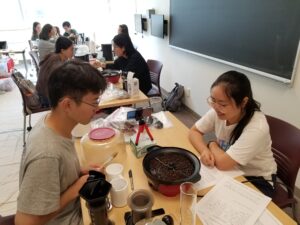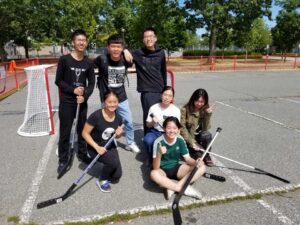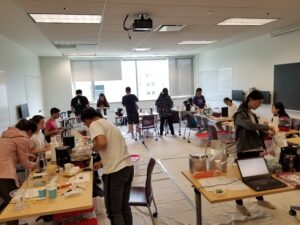UBC Engineering’s world-class faculty and researchers are committed to an instructional approach that is varied, experiential and engaging. This multi-faceted approach makes UBC engineers stand apart, on a firm foundation from which to build an exciting and rewarding career.
What you might expect/course format
While each course varies based on the subject and instructor, our VSP Packages feature:
- Interactive in person lectures
- Hands-on labs, fun and practical demonstrations
- Team-based assignments
- Fun social activities
- Experience with industry standard software
July 2024 Course Packages
The Power of Chemistry: an Introduction to Matter, Energy, and Chemical Engineering
Matter and energy are the building blocks of our universe. Using their understanding of these concepts, chemical engineers re-organize and transform matter and energy to produce new substances and materials. From the pharmaceuticals we take when we are sick, to the fuel we put in our vehicles, to the plastics, alloys and polymers that we find in our homes, in our phones and virtually everywhere around us, chemical engineers are involved, combining their technical skills with their understanding of social, economic and environmental factors. This course provides an introduction to chemical engineering by providing an overview of the physical processes and laws involved in the conversion of raw materials into refined products, and by applying these concepts to practical applications and designs. Students will have the opportunity to perform laboratory experiments illustrating some key concepts.
The Power of Biology: an Introduction to Biological Engineering
This course provides an introduction to biological engineering. It includes introductions to the fundamental concepts of microbiology, cell biology, genetic engineering, and bioprocessing, before explore more specialized topics like the production of biofuels, novel foods and pharmaceuticals, biomaterials, and recent advances in biotechnology. Humans are faced with new ethical quandaries with these astounding technological advances. Hence, the ethics and social aspects of bioengineering are also discussed. Participants will have the opportunity to apply theory into practice through lab experiments, including the genetic engineering of bacteria, and to witness bioprocessing and sustainable design in action through visits of industrial facilities and a biological waste treatment plant in the Vancouver area.
Prerequisites: No prerequisites
The Science and Engineering of Coffee Production
This course introduces the scientific and engineering concepts that go into coffee production. Each step of the production process will be studied, and the underlying physical and chemical phenomena involved will be explored, from the cultivation of the plants, through the heat and mass transfer involved in roasting, drying and brewing, and through the engineering considerations that go into the design of coffee machines and cups, all while considering engineering, economic, sustainability, and ethical factors. There is hands-on experience through relevant laboratory experiments during which they will develop their own coffee blend and compete against their classmates to see who can make the best product. This course takes a technical look at coffee production, and so familiarity with basic calculus, chemistry, and physics is recommended.
The Science and Engineering of Beer and Wine Production
This course presents the chemical and biological engineering concepts involved in these processes, exploring underlying principles and disciplines including microbiology and cell culture, bioprocessing, heat and mass transfer, and phase separation, all while keeping economics and sustainability under consideration. Participants will work both in the classroom and in hands-on laboratory experiments, during which they will develop and study their own batch of beer. This course is a technical introduction to these processes, and familiarity with calculus, chemistry, and physics is therefore recommended. Participants must be 19 years or older.
Prerequisites: No prerequisites
Minors (students aged under 19 at the start of the program): Not Accepted
Introduction to Computer-Assisted Problem-Solving
This course examines how computers solve problems. Various methods and computational tools will be applied to engineering problems in chemical and pharmaceutical production, energy generation, and engineering design. This course will focus on how to formulate problems that engineers and others face every day, into language and commands that computers can understand. The application of numerical analysis techniques to a variety of systems will be explored, and tools that make problem-solving efficient, fast, and reliable will also be introduced. The tools presented in this course will be applied to the content in the other course in this package, providing participants with a comprehensive overview of the data collection and analysis process, that is applicable to virtually all fields of study in science and engineering. Everyone is welcome and no prior experience in computer programming is required
Introduction to experimental design and data analysis
In both academia and industry, scientists and engineers routinely perform bench- and pilot-scale laboratory investigations. Behind the experiments performed is a considerable amount of time and energy that must be dedicated to the design of efficient and useful experiments, that will provide the data required to accomplish experimental objectives, as well as the time and expertise required to properly analyze that data to extract useful and reliable information. In this course, students will learn the fundamentals of experimental design and analysis, and will acquire thorough experience in designing appropriate experiments to effectively test scientific hypotheses. Students will have the opportunity to design and perform their own unique experiments, and present their data to their peers. Everyone is welcome, and no prior experience in statistics or experimental design is required.
Prerequisites: No prerequisites
For more information
For VSP Chemical and Biological Engineering-specific questions, email undergrad@chbe.ubc.ca.
Student testimonials
– Qiuyu Chen, VSP Applied Science Student, 2019



